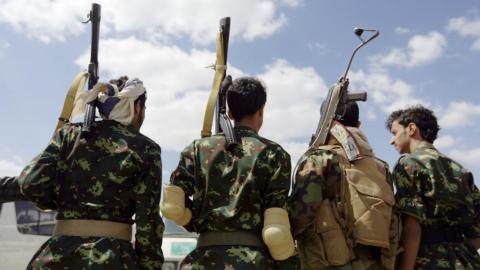Yemenis divided over Mideast peace deal, Iran


Controversy transpired following the publication of a picture showing Yemeni Foreign Minister Khaled al-Yamani sitting next to Israeli Prime Minister Benjamin Netanyahu at the Middle East conference held Feb. 13-14 in Warsaw, Poland.
Although many Arabs criticized the Yemeni diplomat for being photographed next to the Israeli premier, some expressed support — not necessarily for the love of Israel, but rather to spite Iran and its wings in the region, particularly since the Warsaw conference’s most prominent aim is to counter Iranian influence.
The United States announced in mid-January that it would host the ministerial conference in Warsaw to promote the future of peace and security in the Middle East. All Palestinian factions boycotted the meeting, while 11 out of 22 Arab countries attended. US Secretary of State Mike Pompeo said the conference was to focus on Iran's influence and terror in the region.
The conference also tackled the developing US plan to solve the Palestinian-Israeli issue, commonly referenced in the Arabic press as "the deal of the century."
The Israeli media praised the Warsaw conference, which Netanyahu called “a historic turning point.”
Omani Foreign Minister Yusuf bin Alawi described it as “a new and important vision for the future.”
Yamani stressed in a press statement following the conference the “common points between the two countries [Yemen and Israel] to confront the Iranian threat.”
Meanwhile, Bahraini Foreign Minister Khalid bin Ahmed Al Khalifa spoke about the Warsaw conference in a closed meeting, saying, “Confronting the Iranian threat is more serious than the Palestinian cause.”
Following the Warsaw conference, five Iraqi factions — the Popular Mobilization Units, Asaib Ahl al-Haq, Badr Organization, Al-Nujaba and the Hezbollah Brigades — published a document Feb. 17 stating that “anyone who travels to or communicates with Israel would be supporting its criminal behavior.” The document also stated, “Anyone who deals with Israel would be spying and betraying the homeland.”
Meanwhile, leader of Yemen’s Ansar Allah (Houthis) Abdul Malik al-Houthi called for protests against any outcome of the Warsaw conference. Thousands of people from a number of Yemeni provinces answered the call Feb. 17.
Observers believe that while Israel emerged victorious from the conference, Iran also benefited politically by mobilizing its allies on several levels.
Meanwhile, the Arab participants — including Yemen, which was represented by Yamani — did not gain any fruitful results from the conference. On the contrary, Arab states were met with a flood of popular criticism. Some ministers rushed to justify their positions following the conference, Yamani included, saying that meetings with Israeli officials only occur under the dome of the United States and the Security Council, denouncing the popular focus on his seat next to an Israeli official in Warsaw.
Undersecretary of the Yemeni Ministry of Information Fayyad al-Numan told Al-Monitor, “The Houthi militias’ attempt to exploit Yamani’s picture in the conference only serves their terrorist projects and their objective of lighting up the fighting fronts in Yemen.”
He pointed out that “Yemen’s support of the Palestinian cause still stands, and no Iranian tool working to create chaos and terrorism in the Arab region can change it.”
Numan added, “The official position of the Yemeni government was clear when it took part in the Warsaw conference in order to introduce the Yemeni cause and mobilize global support to save the Yemeni people from this [war], caused by the Iran-backed Houthis. This was completely unlike the relationship that the Houthis have with the Zionist entity, which even led to giving up Yemeni artifacts.” He accused Houthis of working with Israel to allow a Jewish Yemeni family to immigrate in March 2016 to Israel carrying an old manuscript of the Torah, which it handed over to Netanyahu.
Meanwhile, Saudi support for the UN-recongized government continues, as does Iran's indirect support for the Houthis, while millions of civilians are living on the verge of famine.
“There needs to be an international alliance to curb Iran's terrorist project in Yemen, Syria, Iraq, Bahrain and Lebanon,” Numan said, adding, “The [popular] focus on Yemen [at Warsaw] was only by the Iran-controlled media in order to serve the Houthis’ coup attempts in Yemen. It is a response to Iran’s failure in Yemen given the intervention of the Arab coalition led by Saudi Arabia.”
Observers believe that the Yemeni government’s official position on the Warsaw conference seems vague; while it formed with Israel what seemed to be an alliance in Warsaw, it still rejects normalization.
Former Yemeni Foreign Minister and presidential adviser Abdulmalik al-Mekhlafi tweeted Feb. 14, “Normalization or the suspicion of normalization with the Zionist enemy in any way is contrary to all our people’s principles, history and constitution.”
AFP.

Paris — The French humanitarian organization Acted announced that it has delivered cash assistance to nearly 89,000 people affected by displa…

Sana’a — Fuel and food imports into ports under the control of Yemen’s Houthi movement on the Red Sea have continued to fall for…

ADEN — Yemen Airways, the country’s national carrier, announced it will resume flights between Aden and Abu Dhabi beginning in January…